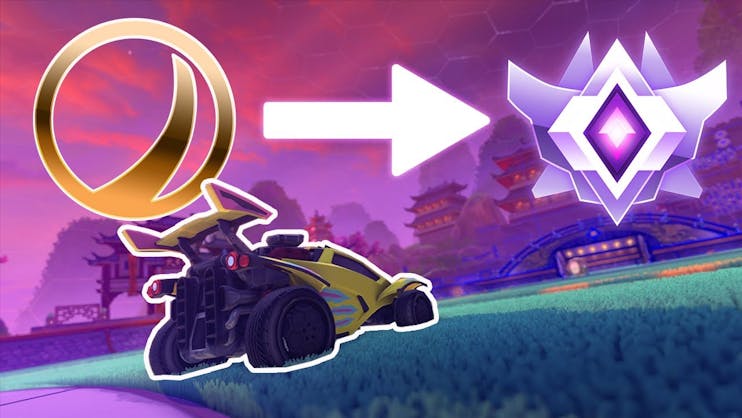
How game devs can help their players improve - and drive engagement in the process
Successful live service games all have two things in common: 1) they’re fun to play and 2) give players a reason to keep coming back. Sometimes, that reason is self-improvement.
Ranking and progression systems have made improvement more tangible for players, and internal and external tips, trackers, and data collection tools have made it more accessible. Titles like League of Legends and Aimlab clearly showcase that players value self-improvement and that it significantly drives engagement in the long run.
Today, we’ll take a look at how game developers can best leverage data to give players of all levels actionable tips for improvement, and in the process, boost the health and longevity of their game. We’re using Rocket League - one of the longest running, most popular live service games - as an example because it’s easy to get into but extremely difficult to master.
We’re using a sample of 2,500 Rocket League games across a variety of skill levels (Bronze through Platinum) obtained from ballchasing.com. This represents roughly the bottom 60% of players - ideal targets for improvement tooltips. Improving beyond this point is harder and generally requires more individualized feedback.
We’ll be doing all the analysis using Datawisp, of course.
Choosing Metrics
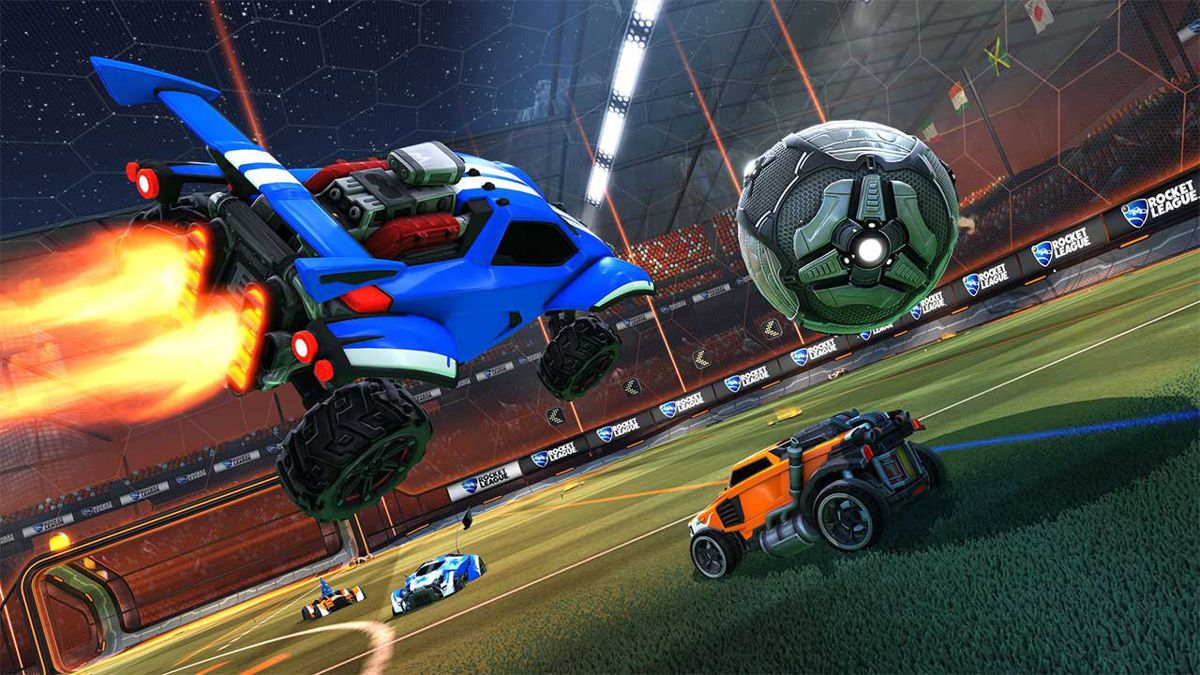
Rocket League is a very simple game on the surface: it’s soccer, but with rocket powered cars. However, as in soccer, there are many things players can do to get better. Putting ourselves in Epic/Psyonix’s shoes, how can we nudge players towards skills that make them better players?
When doing this kind of analysis, we usually look for areas where 1) there is a big gap between low and high rank players and 2) there are clear steps that can be taken to reduce that gap. The latter is very important - obviously “scoring more goals” would help Bronze players rank up but it’s not particularly actionable advice by itself.
In the case of Rocket League, this lead us to examining:
The importance of collecting (and stealing) boost
Actually playing defense
Team coordination
This will vary greatly from game to game and obviously is highly dependent on 1) what data is available and 2) your own understanding of your game. Here, our data set is decent (as far as what 3rd parties can obtain) but still limited, and our COO used to run an RLCS-winning Rocket League team, so we have a fair bit of experience with the game.
Note: this is a pretty high level analysis meant as a rough guide. We know that correlation does not necessarily equal causation, but educated guesses backed by data and game knowledge are better than nothing and should at least help you get started.
Collecting (and stealing) boost
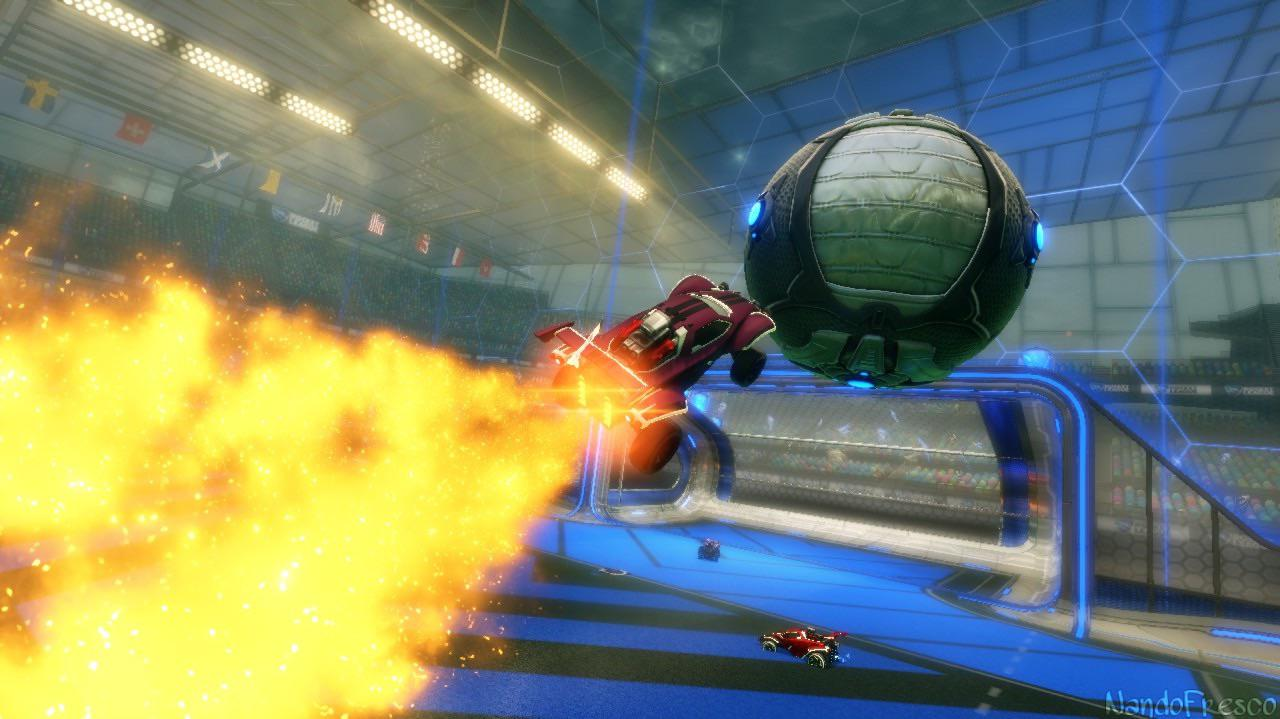
Collecting boost lets players traverse the map faster and perform aerial maneuvers that open up opportunities for shots on target, saves, and more. The best players use boost almost constantly, so picking it up regularly is very important. Here you can see that players in higher ranks maintain higher levels of boost on average.
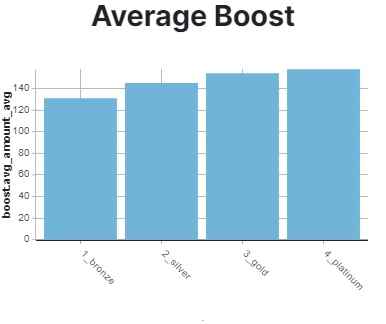
Even though the differences between ranks aren’t huge, Rocket League is a game of fine margins and sometimes being just 2% short on boost can mean the difference between saving a shot or conceding a goal.
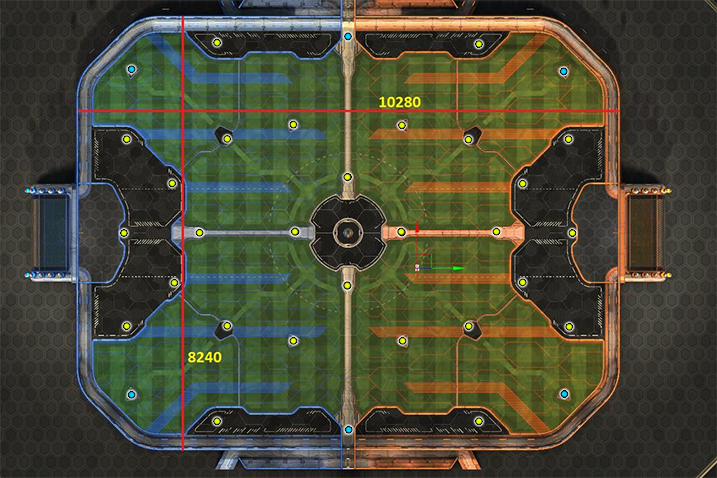
“Stealing” boost refers to collecting boost from your opponents’ side of the map. Attacking teams that steal boost make it harder for defenders to block shots and force them out of position to collect boost. Stealing boost is a good thing and as we can see, higher rank players do this more often.
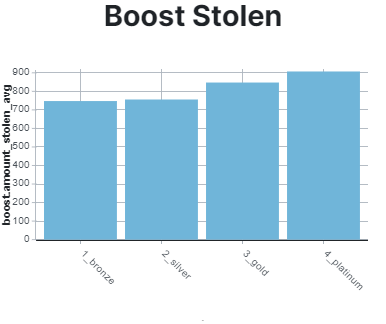
A basic takeaway might be to tell all players to use boost more often and to pick it up and steal it as much as they can. But overwhelming players with feedback (especially low level ones) can prevent them from improving at any one particular skill. We can give more specific and actionable feedback for players of various ranks by examining the data more closely.
In terms of collecting boost, the biggest jump happens from Bronze to Silver. Afterwards, players continue to improve but at a lower rate. Stealing boost on the other hand isn’t as important in Bronze, but becomes much more important if players want to reach Gold. This makes sense - at the lowest levels, simply picking up any boost provides an advantage. Once players start collecting more boost, strategically stealing it from the opposition half can yield rewards.
Based on this data, we could target Bronze players with a message like:
“Picking up boost is very important and improves your chances of winning. Make sure you’ve always got some!”
And Silver players with:
“Stealing boost from your opponents’ half makes it harder for them to defend your attacks and slows down their counterattacks.”
Actually Playing Defense
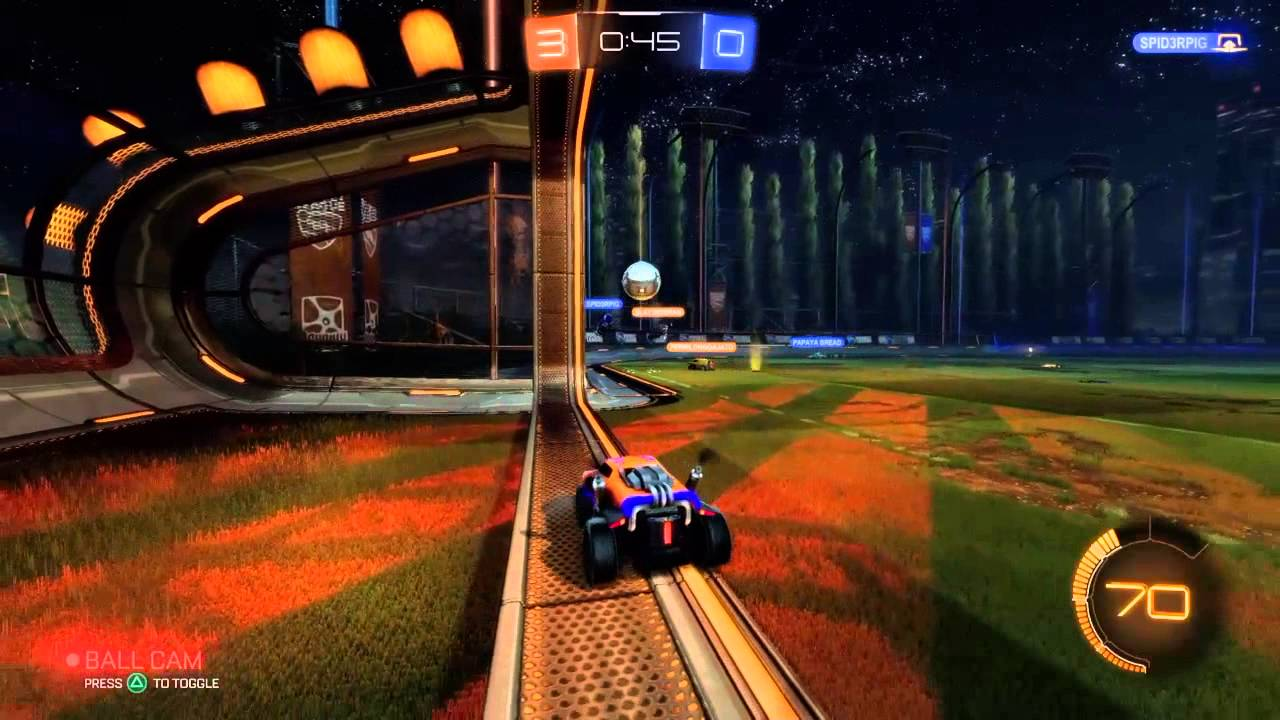
As the old adage goes, “defense wins championships.” Rocket league is no exception. One of the areas where we can see the greatest gap between beginners and experienced players is “saves per team.” Defense is very hard in Rocket League - while it’s relatively easy to bump the ball and send it flying into the top corner of a goal, it’s much harder to correctly use your boost to fly up into the path of the ball and prevent a goal. This skill becomes very important as players rank up - Platinum players save 3x as many shots per game on average as Bronze players.
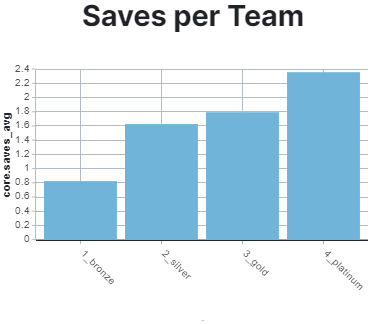
The biggest gap is between Bronze and Silver players. Bronze players simply do not play any effective defense whatsoever: the average Bronze team (3 players) has under one save per match. It’s pretty common to see Bronze games where all six players are just chasing after the ball (where ballchasing.com gets its name) with no regard to defensive positioning.
Based on this data, it would be a good idea to show Bronze players tooltips about simply playing more defense. Since we also want to remind them to pick up boost, we could do that when they win games and urge them to focus on defense when they lose. We could even combine those tips and say “picking up boost lets you quickly get back in position and defend your goal.”
The next big improvement happens from Gold to Platinum. This is typically where players get better at maneuvering their car in the air and can start to make more advanced saves. Rocket League already has many great training tools for improving mechanical skills, so we could remind players of the importance of defense and point them to some of these tools. We could also add useful stats like “players who spend X amount of time in training tools perform Y% better than those who don’t.”
Successful titles like League of Legends do this all the time to push players towards good behaviors. Riot relates everything from using emotes and map pings to communicating in a more friendly tone to an increased win percentage for its players - and it works.
Team Coordination
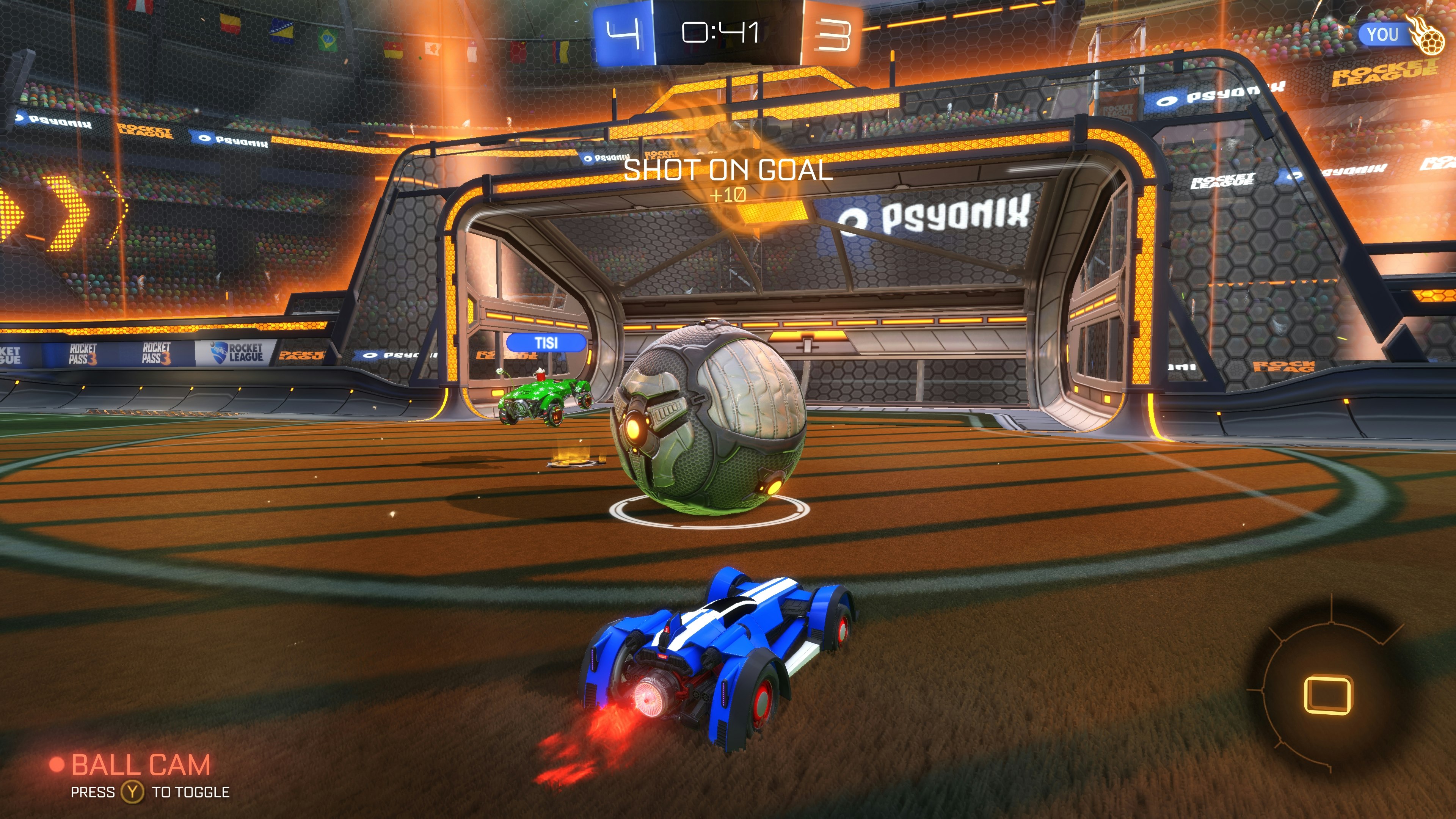
Another area where there’s a big gap between low and high rank players is unassisted goals (goals scored by only one player’s actions). Unassisted goals happen for several reasons: at the highest ranks, because a skilled player can dribble past all three opponents and score on their own, and at the lowest ranks, because someone whacks a ball and it just rolls into an empty net. The latter is a lot more common - in Bronze, nearly 55% of goals are unassisted. This number is ~25% less for Platinum players and decreases consistently as players improve. At the highest levels of play (not shown here) that figure is under 30%.
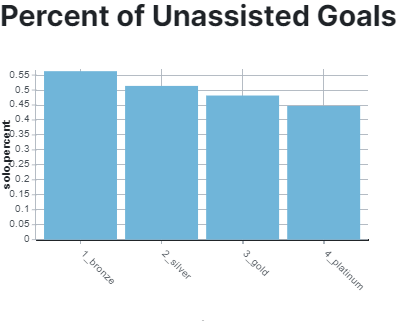
A good way to think about unassisted goals is to simply flip the metric and think about it as “good players score more assisted goals,” or even “good players assist more goals.” This can help make the data more actionable for players. As players get better, they score more from rebounds and by receiving good passes from their teammates (both of which count as “assisted”).
Based on what we already know about boost and defense, we can give players at every rank advice:
Bronze: “Simply focusing on defense will prevent many easily avoidable (unassisted) goals, and collecting more boost will help you get into better defensive positions.”
Silver / Gold: “Stealing boost helps you get into more dangerous positions in the opponent’s half and capitalize on loose balls near their goal - try to anticipate your teammates actions and position yourself to score off rebounds.”
Platinum: “Try to create more chances for your teammates by passing the ball into dangerous areas - e.g. by hitting it along the side walls or by bouncing it against the back wall.”
Final Thoughts
Self-improvement can be a powerful driver of engagement in modern live service games. There are many ways game devs can use the data they already collect to start pushing players towards desirable skill sets. What we’ve shown today is quite basic, but hopefully, some of these examples can help you start thinking about ways that you can do this in your own game.
While traditionally competitive games like Rocket League, League of Legends, Dota 2, etc. can clearly benefit from this, self improvement as a driver of engagement isn’t only limited to these “esports” titles. Even casual games like Wordle can push friends to become incredibly competitive, and having the lowest number of attempts becomes something of a bragging right. Humans are inherently competitive and tapping into that can create more motivation to play and improve at your game.
At Datawisp, we’re committed to helping game developers of all sizes make the most of their data. Our platform is designed to be accessible to anyone - not just data professionals - so your game team or community managers can easily use it on their own. We also have a lot of experience with player improvement, both through our previous startup and from years spent running a professional esports team. If you’re curious about how your game could better leverage data to drive player engagement, or if you’re facing any other pain points related to data, let’s chat. Shoot us an email at hello@datawisp.io or hop in our public Discord channel here.